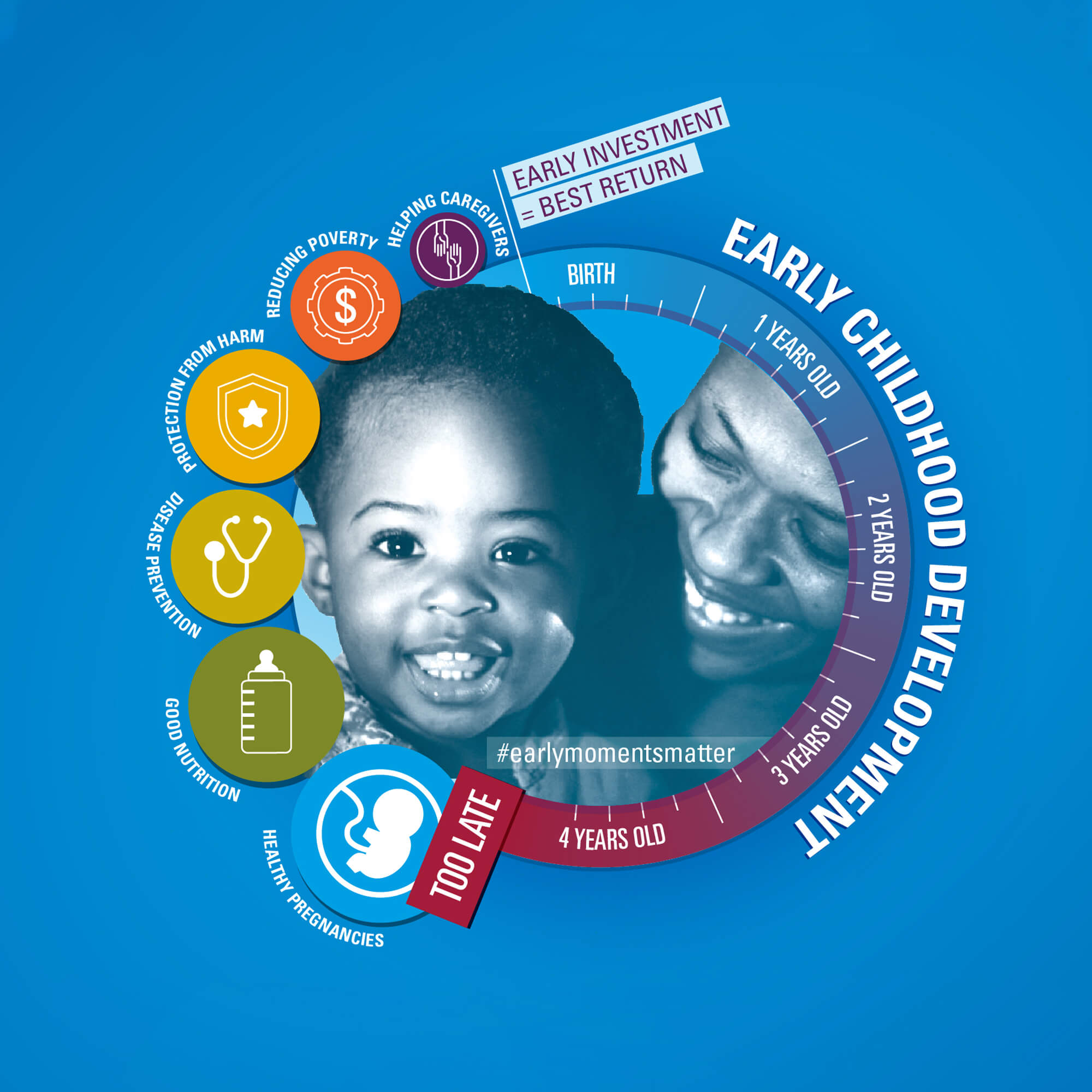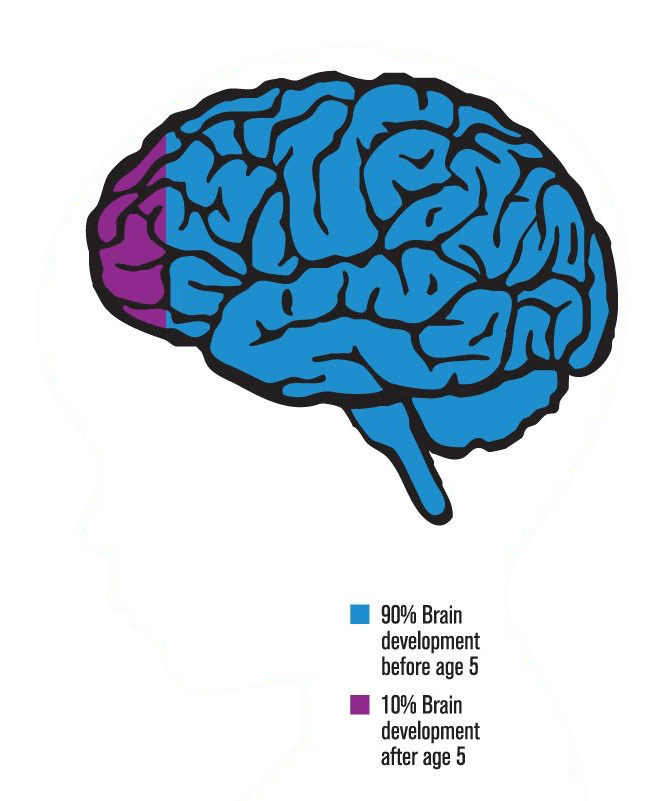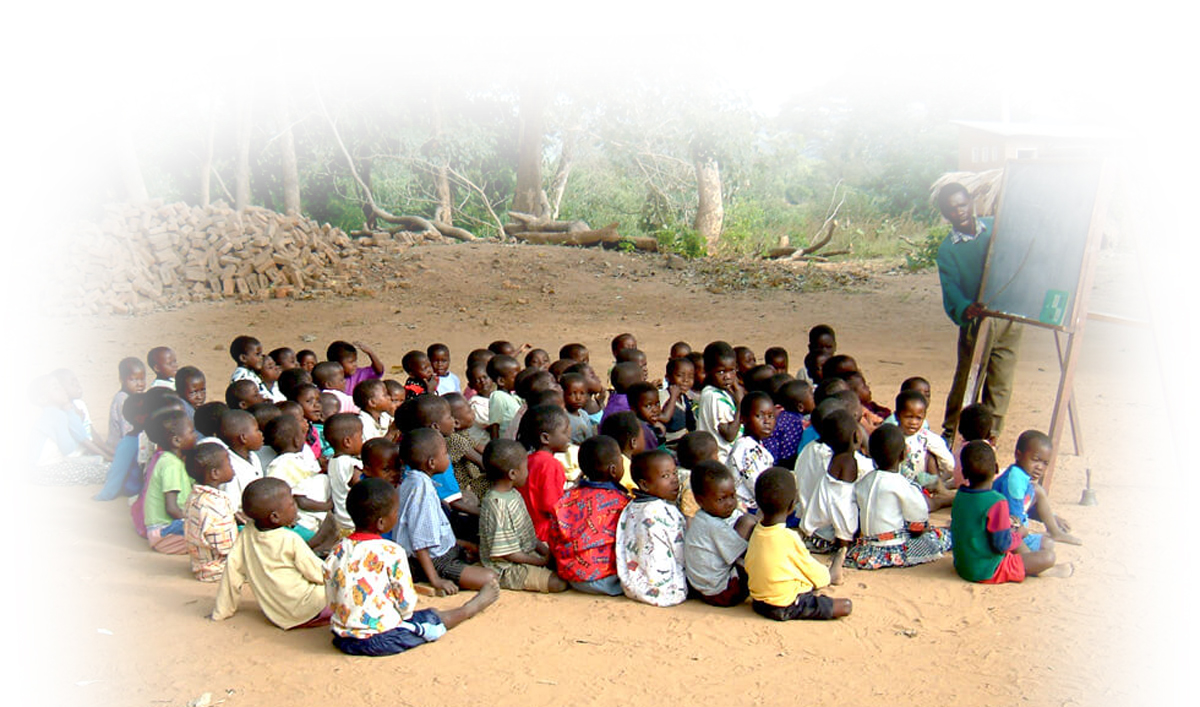EARLY CHILDHOOD DEVELOPMENT (ECD)
Investing in young
children is a sure win
The world development report of 2018 shows that Investing in ECD is one of the smartest investments a country can make to break the cycle of poverty, create reduced inequalities, stimulate learning through quality education and boost productivity later in life through decent work.
EARLY CHILDHOOD DEVELOPMENT (ECD)
Investing in young
children is a sure win

The world development report of 2018 shows that Investing in ECD is one of the smartest investments a country can make to break the cycle of poverty, create reduced inequalities, stimulate learning through quality education and boost productivity later in life through decent work.
ECD is also an investment which boosts economic growth. Evidence suggests that an additional dollar invested in quality ECD programmes yields a return of investment of between $6 dollars to $17 dollars.
The report further indicates that, advances in neuroscience and recent economic studies show that early childhood experiences have a profound impact on brain development and on subsequent learning, health, and adult earnings.
Children who do not receive early mental stimulation, are likely to learn less in school and earn less as adults.
For example, a 20-year study in Jamaica showed that disadvantaged young children who were exposed to high-quality early stimulation interventions as infants and toddlers earned up to 25% higher wages as adults than those who didn’t have access– equivalent to adults who grew up in wealthier households.This early childhood intervention levels the plain field which enhances the promise of overcoming social disadvantages and breaks the intergenerational transmission of poverty.
In Uganda, children aged three to five years are expected to be in nursery school while those aged 6 to 12 years are expected to be enrolled in primary schools. Currently, the proportion of children in pre-school expressed as a percentage of the population aged 3-5 is 9% which translates into a gap of 91%.
Pre-school is not accessible to majority in rural areas owing to financial constraints. We have UNICEF to thank for the few ECD centres in rural areas as most of the rural inhabitants find them a waste of money and time. Although the quality has slightly improved thanks to the introduction of guidelines that saw some improvement from when everyone did what they thought was right. However, majority of the centres do not meet the minimum quality standards.
There is an acute shortage of qualified teachers in most of the ECD centres. The man-power gap has been bridged by primary seven and senior four leavers who for known reasons fail to continue with education. A kindergarten teacher should train for two years, after at least 6 passes at O level. This is, however, not the case in many ECD centres. It is about those who are interested, those who have failed to further their education
KAINOafrica understands that the first 1,000 days of life – from conception to age three – open a critical and singular window of opportunity. A three-year-old’s brain is twice as active as that of an adult and the connections their brain makes are the building blocks of their future.
Through the KAINOtab, mobile & web apps, we ensure digital access to high quality content for preschool programs tailored for children under 3years and a nursery guide for 3-5year olds respectively which increases the frequency, quality of stimulation and opportunities for home learning through gamification of the curriculum which improves cognitive, socioemotional, language development skills and learning by digitised caretaker’s guides which meet the real learning situation with a number of suggested tactile activities to aid the learning atmosphere since children are courteous and imaginative.
The KAINO Teacher guide was derived from the learning framework to be followed by all pre-primary schools in Uganda developed by the National curriculum development center (NCDC). This termly book suggests the developmental activities that are to be done by children for a purpose of making them feel immensely satisfied when an activity is completed. It also suggests the materials/resources to be used during the teaching and learning process.The lesson development/ procedure/ hints aid the care giver on how to logically handle specific areas in a bid to achieve the competence.
However, we encourage caregivers to be dynamic since children have different abilities and learning needs.
This, followed by training support, will solve the many challenges caregivers come across while implementing the learning framework and improves primary school learning as rigorous studies show that children benefiting from quality ECD programs learn far better when they enter primary school.
ECD SHOULD BE A MUST NOT ONLY A RIGHT!

“Children who do not receive early mental stimulation, are likely to learn less in school and earn less as adults.”
~The world development report 2018~
EARLY CHILDHOOD DEVELOPMENT (ECD) IN RURAL
ECD should be a must not only a must!
Did you know that…..
Life outcomes are hugely influenced by a child’s development during the early years. Biological systems develop sequentially and cumulatively, so what happens early in life lays the foundation for future development. Between the time of gestation and a child’s sixth birthday, the brain matures faster than at any other time of life. This period is also when the brain, along with its supporting systems, is most malleable.
Children, who do not receive early mental stimulation, are likely to learn less in school and earn less as adults. This early childhood intervention levels the playing field which enhances the promise of overcoming social disadvantages and breaks the intergenerational transmission of poverty.
In Uganda, children aged three to five years are expected to be in nursery school while those aged 6 to 12 years are expected to be enrolled in primary schools. Currently, the proportion of children in pre-school expressed as a percentage of the population aged 3-5 is 9% which translates into a gap of 91%.
Pre-school is not accessible to the majority in rural areas owing to financial constraints. We have UNICEF to thank for the few ECD centers in rural areas as most of the rural inhabitants find them a waste of money and time. Although the quality has slightly improved thanks to the introduction of guidelines (NCDC) that saw some improvement from when everyone did what they thought was right.
However, many ECD teachers still lack the capacity to interpret these guidelines and majority of the centers do not meet the minimum quality standards.
There is an acute shortage of qualified teachers in most of the ECD centers. The man-power gap has been bridged by primary seven and senior four leavers who for known reasons fail to continue with education. A kindergarten teacher should train for two years, after at least 6 passes at O level. This is, however, not the case in many ECD centers. It is about those who are interested, those who have failed to further their education.

Through the KAINOtab, mobile & web apps, we ensure digital access to high quality content like teacher guides, children’s learners workbooks, formative assessment portals etc for kindergarten programs tailored for children 3-5years which improves cognitive, socio-emotional, language development skills and learning. Our system is also built to run on both online and offline mode and therefore can be implemented in both rural and urban schools making it highly scalable for widespread reach and adoption as our MISSION.



